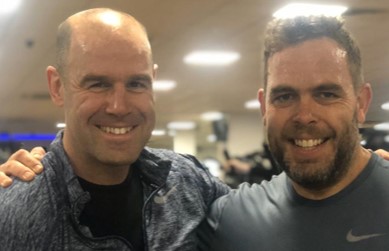We GPs need to embrace new ways of managing our stress

It’s well-known that GPs’ stress can affect our performance. Underperform in high-level sport, or as a company CEO, and you may get a slating in the press or even sacked. Underperform as a GP, and you may get sued – a knowledge that only adds to the stress.
As a full-time partner at a triage-led urban practice, there are many days where I feel utterly spent, overwhelmed by the sheer volume and complexity of our work. The irony hangs heavy – we spend our lives helping patients, but we’re not good at helping ourselves.
How fortuitous it was, then, that I got chatting to Charlie Hodgson over a pint in our local. Charlie’s experienced stress – not as a GP, but as an international rugby player representing England and the British Lions.
When he retired three years ago, he developed his interest in stress management and now firmly advocates the Mind5 M.E.T.H.O.D, which tackles stress and improves performance through sport and exercise.
The more we talked, the more I understood the parallels between our professions. We’d both been under considerable pressure; struggled to maintain energy levels; and encountered distractions which sometimes made focus impossible.
Charlie invited me to confront this through his six-session Mind5 course. I was also sleeping terribly; drinking too much caffeine and alcohol; overweight and rarely exercising. I was turning into a problem patient, heeding none of my own advice, and surviving at work rather than thriving.
I was intrigued by the idea that we’d be using exercise to highlight my own responses to stress, and we also touched on key themes relevant to GP work – maximising energy; teamwork and focus. I’d then learn about something for which I now strive towards every working day – to flow.
Underperform as a company CEO and you may get a slating, underperform as a GP and you may get sued
Stress
I was sceptical that Charlie – or any non-GP – could simulate the stress we feel, but I’d forgotten that we’re just human beings with innate physiological responses. Whether you’re triaging hard in a bustling surgery or negotiating hard in the office, stress will make your heart rate rise and breathing quicken.
These responses can be distracting and cause anxiety, so exerting control over them makes us better-equipped at dealing with the pressures of the job. I learned about how conscious breathing can activate the parasympathetic nervous system – the technique pushes back the impulse to fight or flight, and I even used it during a frantic on-call soon after. It felt a little odd, amid the chaos, to take a moment to take control of my breathing, but it helped me to de-stress and regain control.
Energy management
Do we ever stop to reflect on our energy givers and takers? For all the time I’ve spent lecturing patients on sleep hygiene, exercise and diet, I’ve never committed myself. After two sessions, however, I spent the next three days drinking lots of water, restricting caffeine and avoiding alcohol – and visiting the gym. I’ve not made it habitual yet, but for those few days, I felt energised like never before.
Teamwork
GPs often work in isolation, which can be lonely and demoralising. So amidst shuttle runs, Charlie shared experiences of different cultures within elite sport. Teams – including GP practices – need a compelling direction, strong structure and supportive context. Knowing we react around others when we’re stressed will ultimately dictate team synergy.
Focus
My GP trainer claimed that GPs make more decisions per day than any other professional. Just consider it for a moment: every consultation, every result, every query. How can we stay focussed when these all add up?
Back on the playing fields, I was punching a bag as hard as I could, then Charlie asked a number of simple questions. As my mind wandered in search of answers, my intensity slowed and I lost rhythm. It felt like being asked to sign a script when you’re midway through a dictation, reminding me how vital it is to identify distractions, then to stop, stay calm, take a break, and re-focus.
Optimal performance
In 1990, psychologist Mihalyi Csikszenmihalyi argued that people are happiest when they’re in state of flow. Minutes and hours can pass where an individual is absorbed in the task in hand. For Charlie, there were the matches where everything clicked, and he excelled. For me, there are odd surgeries which fly by with relative ease – I’m in my element and enjoying myself.
We modelled the concept using exercise, and whilst it didn’t happen immediately, I began to appreciate the happiness of being in a state of flow.
It’s obvious that GPs get stressed at work, but we’re not so good at understanding how we work and why this makes us stressed – nor do we have strategies to help us. Elite sportsmen also suffer stress, but clubs spend thousands on sports psychologists, precisely to understand why. They’re then equipped with the tools to help.
This Mind5 M.E.T.H.O.D enlightened me. The idea of practising mindfulness to retain focus when I’m up to my eyeballs on a Friday night had been anathema. Likewise, I’d probably have chortled at any suggestion that focussed breathing could alleviate acute stress, but I’ve used them and they work. I’m more energised, more focussed, now I just need to stay in flow – and any GP would benefit too.
Dr Thomas Gillham is a GP partner, trainer and PCN director in Hertfordshire









